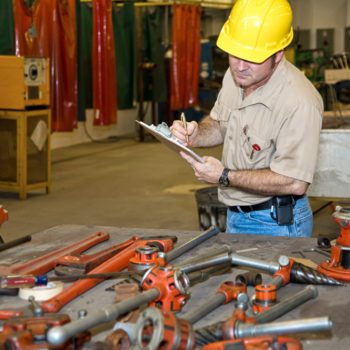Why We Love It
-
$54,560Potential Avg. Salary
-
7.7%Job Growth Rate
-
Growing DemandJob Outlook
-
Dependable Daily WorkloadCareer Attribute
Crane operators operate mobile cranes, tower cranes, self-erect cranes, and boom trucks to transport loads between surfaces that are unreachable with vehicles. They evaluate cranes’ conditions, perform maintenance tasks, set up cranes, ensure loads are balanced, and operate cranes precisely and carefully.
Recommended Schools
What is a Crane Operator?
The following job responsibilities are common for individuals in crane operator roles:
- Evaluate the condition of cranes before use and perform any needed maintenance tasks
- Set up and dismantle cranes that are used on job sites
- Assess any risks of the job, ensuring loads are balanced and accounting for wind speeds and other uncontrollable elements that could affect load transport
- Use care and precision to lift loads with a crane hook and transport the load safely to its destination
A Day in the Life
Cranes are used in construction to transport loads of materials to locations that are unreachable by vehicles and impractical for carrying. For example, a crane may be used to transport steel beams from the ground to the top of a skyscraper for use by construction workers who are erecting the highest levels of the building. Crane operators are the individuals responsible for getting the load from one destination to another, ensuring the safety of all workers and keeping materials from being damaged.
Crane operators may operate many different types of cranes, including mobile cranes, tower cranes, self-erect cranes, and boom trucks. And while their main responsibility is transporting loads from one destination to another, the actual transport of loads encompasses the least amount of time for their job. Before loads can be moved by cranes, the crane operator must ensure that everything is working properly and the area is prepped for the load-moving task.
The crane operator must first ensure his/her crane is issue-free. This means inspecting working elements and fluid levels and performing routine maintenance tasks. He/she must also set up the crane that will be used in some scenarios, so a lot of time is spent setting up and dismantling cranes. The crane operator must also conduct a thorough safety inspection of the area where the crane will be operated, ensuring elements like wind, foot or car traffic, or uneven pavements are taken into account.
Typical Work Schedule
Most crane operator positions are full-time jobs conducted during normal business hours. However, overtime may be required on occasion to meet deadlines, and evening and weekend work may be required to make up for weather delays or to move loads at times when areas are less populated.
Typical Employers
Most crane operators work for construction or manufacturing companies. They may work for steel erectors, paper mills, or automobile manufacturers, or they may be employed by a crane operation service that contracts crane operators out to work as needed on construction projects.
Recommended Schools
How To Become a Crane Operator
Most aspiring crane operators begin their careers by enrolling in a crane operations educational program through a community, trade, or vocational college. These programs teach students the basics of crane operation—how to operate different types of cranes, how to perform crane maintenance, and how to adhere to safety standards and regulations. By completing a certificate in crane operation, you’ll be prepared to find an apprenticeship in the field, assisting an experienced crane operator on the job.
There are several sources you can utilize to find an apprenticeship under an experienced crane operator. First, check with your school to find out if they have partnerships with local construction companies to place graduates into apprenticeship positions. Second, check with local unions that support crane operators—often, they’ll be willing to place new crane operators into apprenticeship positions. If neither of those opportunities lead to apprenticeships, reach out to local construction companies to inquire about apprenticeship opportunities.
To operate certain types of cranes, you may need to have state licensure. The licensing requirements vary by state and locality, but generally require completion of an educational program or apprenticeship and passing written and practical tests. Additionally, continuing education may be required to ensure crane operators stay up to date with technology and procedural advances in the field.
Crane Operator Salary Data
We’ve provided you the following to learn more about this career. The salary and growth data on this page comes from recently published Bureau of Labor Statistics data while the recommendations and editorial content are based on our research.
National Anual Salary
Low Range
$39,310Average
$54,560High Range
$82,760National Hourly Wage
Low Range
$19/hrAverage
$26/hrHigh Range
$40/hrHow do Crane Operator salaries stack up to other jobs across the country? Based on the latest jobs data nationwide, Crane Operator's can make an average annual salary of $54,560, or $26 per hour. This makes it an Above Average Salary. On the lower end, they can make $39,310 or $19 per hour, perhaps when just starting out or based on the state you live in.
Salary Rankings And Facts
#331 Nationally for All Careers
Highest Education Among Crane Operators
- 0% Doctorate
- 0.1% Masters
- 2.2% Bachelors
- 5.7% Associates
- 20.9% College
- 53.9% High School
- 17.1% Less than High School
Job Growth Projections and Forecast
2014 Total Jobs
45,5002024 Est. Jobs
49,000Job Growth Rate
7.7%Est. New Jobs
3,500How does Crane Operator job growth stack up to other jobs across the country? By 2024, there will be a change of 3,500 jobs for a total of 49,000 people employed in the career nationwide. This is a 7.7% change in growth over the next ten years, giving the career a growth rate nationwide of Below Average.
Growth Rankings And Facts
#289 Nationally for All Careers
What Companies Employ The Most Crane Operators
| Industry | Current Jobs | New Jobs Needed | % Increase |
|---|---|---|---|
| Other specialty trade contractors | 8,900 | 800 | 1% |
| Support activities for water transportation | 3,200 | --- | 0% |
| Support activities for mining | 2,700 | 500 | 0% |













